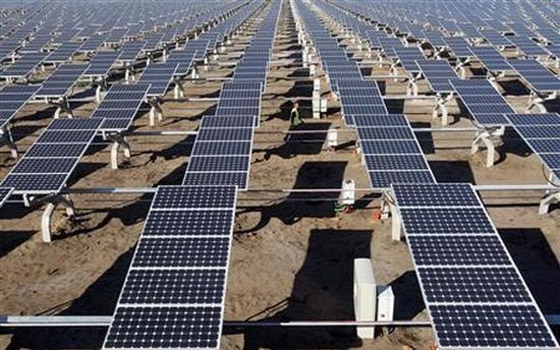The Kingdom, which is planning massive investment in renewable energy, hopes to export solar electricity to Europe in winter, says a senior official.
It would be viable for Saudi Arabia to export up to 10 gigawatts, the equivalent of 10 nuclear plants, via North Africa and Italy or Spain, Khalid Al-Sulaiman, vice president for renewable energy at the King Abdullah City for Atomic and Renewable Energy (KACARE) was quoted as saying at a conference in Paris.
"It is not a project, it is a potential. It has to be examined thoroughly by all," Al-Sulaiman told Reuters.
According to Reuters, he said solar energy capacity in Saudi Arabia is "almost non-existent" at the moment, with only about 10 to 11 megawatts of capacity installed in the entire country.
But the Kingdom has huge ambitions to build renewable and nuclear capacity as it tries to reduce domestic oil consumption.
The world's top oil exporter said in February it aims to install 24 gigawatt of renewable power capacity by 2020 and 54 gigawatt by 2032, which would make Saudi Arabia one of the world's main producers of renewable electricity.
Al-Sulaiman said the first solar tenders will be offered this year. A challenge for Saudi's electricity sector is that during winter and parts of spring and fall, 45 percent of generation capacity sits idle. Cooling accounts for more than 50 percent of electricity demand in summer.
"We have thoroughly examined the potential for exporting electricity from dormant capacity during the off season to countries where peak demand coincides with our low demand season," Al-Sulaiman said.
He said studies show that the grid investment required to bring Saudi electricity to Europe would amount to between 15 to 20 percent of the total investment required to install some 20 gigawatt renewable generation capacity.
"Our study demonstrates that trading with the EU is economical, depending on the route chosen," he said. Export capacity levels of 3, 5 and 10 gigawatt had been studied.
Transmission cables could go either via North Africa or via Turkey and Bulgaria, but the latter route is less advantageous because Bulgaria is a net exporter of electricity.
The Saudi electricity export plan is similar to the Desertec initiative, which aims to bring power to Europe from North Africa.
Al-Sulaiman said that, unlike Desertec, KACARE's plan would not require a third party to install generation capacity since KACARE would lead generation and connection investment.
He said he hoped European authorities would study the idea.
"If we could reduce the need to install generation capacity by, say, 10 to 20 percent through the ability to trade effectively, the savings would be tremendous," Al-Sulaiman said.
He said the project would take five to 10 years to implement but declined to give a cost estimate. Desertec has been estimated to cost up to 400 billion euros ($ 512 billion).
Jerome Pecresse, president renewable energy at French Alstom, which specializes in power grid equipment, said a Saudi Arabia-Europe link was technically feasible, provided financing is available.
Antoine Cahuzac, head of French utility EDF's renewable energy unit, said public resistance to high-voltage lines will be an obstacle to all long-distance grid projects.
Saudi Arabia has equally ambitious plans to build 17 gigawatt of nuclear power capacity by 2032, and French utility EDF and reactor builder Areva hope to win a slice of the market.
EDF CEO Henri Proglio told the conference Saudi personnel are already in training in EDF facilities. Recently, UAE reports said Masdar is bidding for a slice of Saudi Arabia›s burgeoning solar market after opening the 100 megawatt Shams-1 plant in Abu Dhabi.
The company is seeking to capitalize on an emerging market as regional oil-exporting economies seek to boost their renewable energy output.
"In the near future we will be announcing projects in the Middle East and North Africa region," said Sultan Al Jaber, CEO of Masdar, Mubadala›s clean energy unit, was quoted saying by the UAE media.
He was speaking at the inauguration of the Shams plant, the first of a series of renewable energy projects that will provide 7 per cent of the emirate›s electricity by 2020, according to government plans.
Masdar is the majority owner of Shams, with France›s Total and Spain›s Abengoa sharing the remaining stake.
"Saudi Arabia is one of our target markets," he said.
"We will go wherever the projects make sense, as long as there is a regulatory framework that is solid, that›s reliable, and as long as the returns meet our commercial thresholds."
The first tenders for solar plants are scheduled for the first half of this year, when 500 MW to 800MW of generation capacity will be bid for, according to a February white paper by the King Abdullah Center for Atomic and Renewable Energy, the body overseeing alternative energy development.
Arab News
14 April






















































